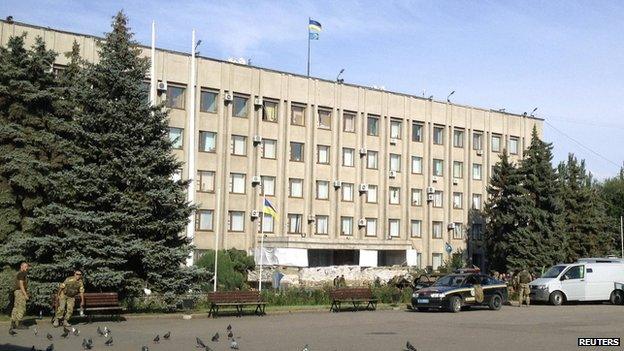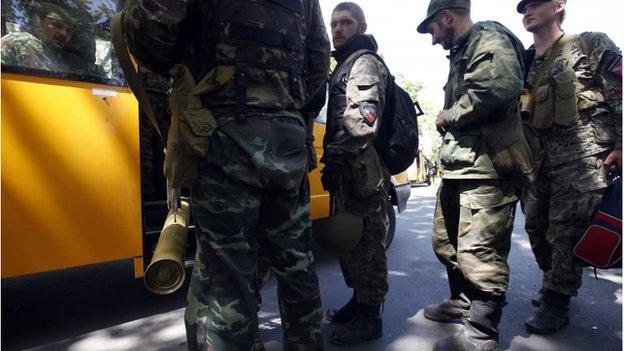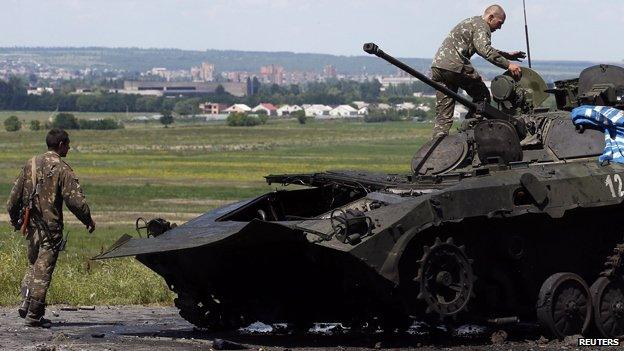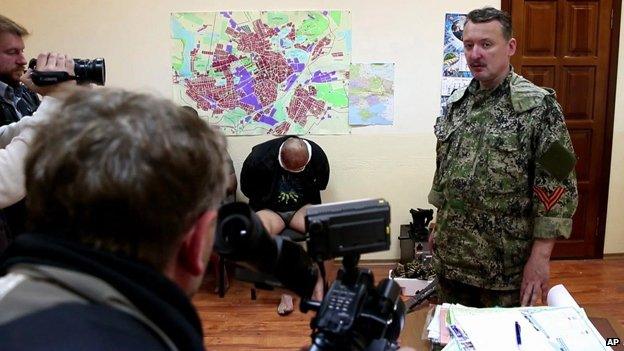Ukraine crisis: Donetsk rebels in mass withdrawal
- Published
A Ukrainian flag has been raised over an official building in Sloviansk, David Stern reports
Ukrainian separatist rebels have pulled back to the main city of Donetsk, abandoning several strongholds in the Donetsk region to government forces.
The pro-Russian gunmen abandoned the cities of Sloviansk and Kramatorsk, as well as some smaller towns, in the north of Donetsk region.
But they have vowed to continue the fight from Donetsk city, describing the withdrawal as a tactical retreat.
Ukrainian forces launched an offensive this week after a truce broke down.
The BBC's David Stern in Kiev says the military's capture of Sloviansk, where the eastern insurgency began in April, is a major victory for the government.
The government said in a statement, external that the rebels had fled after mortar shelling from government forces.
Ukraine's President Petro Poroshenko said the breakthrough was "the beginning of the turning point in the fight against militants".
"This is not complete victory. But the cleansing of Sloviansk from gangs who are armed to the teeth is of huge symbolic importance," he said in a statement.


The Ukrainian flag was raised from government buildings in central Slaviansk

Rebels were bussed out of Kramatorsk hours after they left Sloviansk

Analysis: David Stern, BBC News, Kiev
Of the government's victories so far, the retaking of Sloviansk and raising of the Ukrainian flag over city hall is by far the most significant. The city was not just a command centre for the insurgency - it was a symbol of the militants' continuing ability to thwart Kiev's attempts to reassert control in the east.
Now, it appears that the insurgents may also be evacuating Kramatorsk, another key city. But the question is whether this is a turning point in the war, or merely a shifting of the battlefield.
The rebels are calling this a tactical retreat, which is typically a euphemism for a defeat. But if they are moving en masse to Donetsk, it could still present a major military challenge to government forces. It could also convince the rebels to engage in ceasefire talks more actively - if only to buy more time.


Several of the rebels' armoured vehicles were wrecked in the government offensive
Some rebels were initially quoted as saying they were heading to the nearby city of Kramatorsk.
But it later emerged that the pro-Russian fighters had also abandoned their posts there, and were apparently heading south to the regional capital.
Alexander Borodai, prime minister of the self-proclaimed Donetsk People's Republic, said the rebels had abandoned the entire "northern sector".
The pro-Russian authorities in Donetsk city said rebel fighters had begun to arrive from the north, and urged residents to stay in their homes.
Rebel leaders were quoted as saying the decision to abandon Sloviansk was taken by Igor Strelkov, the military commander of the self-declared Donetsk Peoples' Republic (DPR).
Mr Strelkov, whose real name is Igor Girkin, had pleaded for Russian intervention on Friday saying his men had lost the will to fight.

Who is Igor Strelkov?

Real name Igor Girkin, self-declared commander-in-chief of Donetsk People's Republic
Ukraine says he works for Russian military intelligence agency the GRU
On list of EU sanctions for posing threats to Ukraine's independence
Noted for love of re-enacting Roman, Napoleonic and 20th Century battles

Violence erupted in eastern Ukraine in April, when separatists declared independence in the Donetsk and Luhansk regions.
Earlier this week, the government claimed to have retaken two-thirds of the territory in those regions.
The rebels are still in control of the regional capitals of both Donetsk and Luhansk.
The current crisis started when President Viktor Yanukovych decided last November not to sign an agreement with the EU.
The decision led to street protests in Kiev, and Mr Yanukovych was eventually overthrown.
The developments angered Russia, which annexed Ukraine's Crimea region.
President Poroshenko signed the free trade part of the EU deal in Brussels on 27 June, after earlier signing the political co-operation clauses.